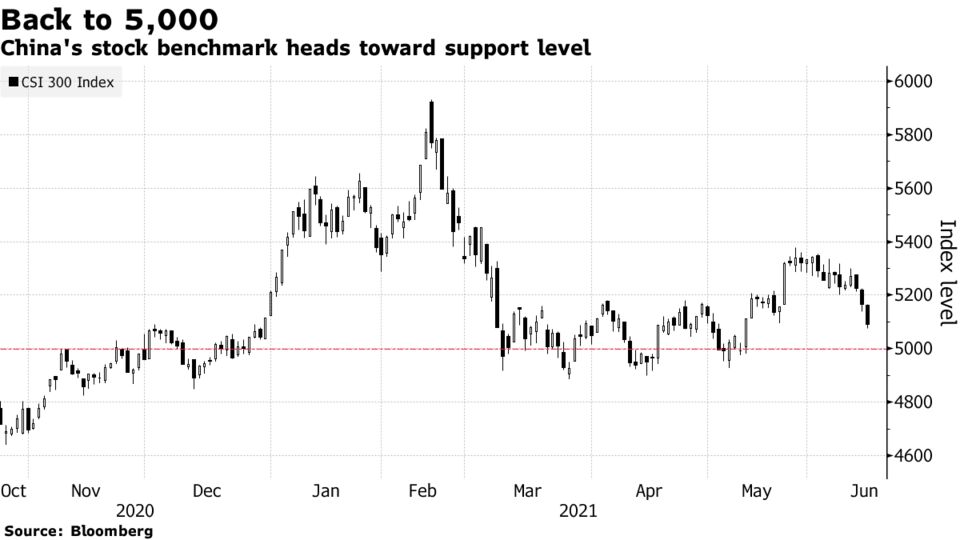China Is Quietly Stepping Up Its Interventions in Markets
- Recent measures target commodities, currency, stock indexes
- Party seeking to ensure financial stability in centenary year
China is resorting to increasingly forceful measures to contain risks to the financial system, in moves that threaten to undermine President Xi Jinping’s pledge to give markets greater freedom.
Authorities have in recent weeks ordered state firms to curb their overseas commodities exposure, forced domestic banks to hold more foreign currencies, considered a cap on thermal coal prices, censored searches for crypto exchanges and effectively banned brokers from publishing bullish equity-index targets. A new rule will bar cash management products from holding riskier securities and limit their use of leverage. On Thursday, an official said China plans to sell metals from state reserves.
While the measures fall short of direct intervention, they risk reinforcing the notion of moral hazard. If traders know authorities are likely to step in to limit gains or losses in an asset class, they can bet on that outcome with some certainty. The implied government backstop can encourage one-way bets -- a challenge for policy makers as they seek to make markets more efficient while supporting an imbalanced economic recovery.
“The problem for China is that there is more debt and more risks to the financial system, making it harder to give up control of domestic markets,” said Michael Pettis, a Beijing-based professor of finance at Peking University and author of Avoiding the Fall: China’s Economic Restructuring. “The more China stabilizes markets, the more fundamentally unstable they become because of moral hazard.”

Easy monetary conditions abroad are exerting pressure on Beijing. Much of the liquidity unleashed by governments and central banks in the past 15 months has headed straight into China -- a huge market offering higher yields, a strong currency and increasingly better access for foreigners. One-sided capital controls mean prices can be skewed by too much money entering the mainland.
Officials have warned of asset bubbles on multiple occasions since January. Even before surging commodities started to stoke inflation risks, authorities had already encouraged a correction in stocks and cornered leveraged bond traders.
The rhetoric intensified last week at a key forum in Shanghai, with the country’s chief banking and insurance regulator calling for “relentless” efforts to battle financial risks. Companies speculating in the currency are “doomed to lose,” said the head of China’s foreign-exchange watchdog. Investors should be wary of yuan depreciation risks as the dollar strengthens, said the China Foreign Exchange Committee in a Wednesday post.
“Policy makers are keenly monitoring financial stability risks,” Morgan Stanley economists including Jenny Zheng wrote in a June 10 note. “China’s Covid stimulus response was meaningful and effective in leading a recovery in the real economy, in contrast to a ‘flood-like stimulus’ approach in some developed markets which partly contributed to record-high asset prices.”
That doesn’t mean the Communist Party is abandoning efforts to reduce the state’s influence. Beijing’s silence on the future of China Huarong Asset Management Co. -- a bad-debt manager deeply entwined in the nation’s banking system -- has shocked investors and challenged long-held assumptions that the government will always bail out systemically important firms to maintain stability.
The notion of “too big to fail” may no longer apply to Chinese borrowers, according to Goldman Sachs Group Inc. analysts.
For more on Chinese financial marketsIndia vs. Brazil. One of Them Has to Be Right on Inflation
Both countries have been crippled by Covid-19 and beset by surging prices, but they’re taking opposite approaches on monetary policy.
No comments:
Post a Comment